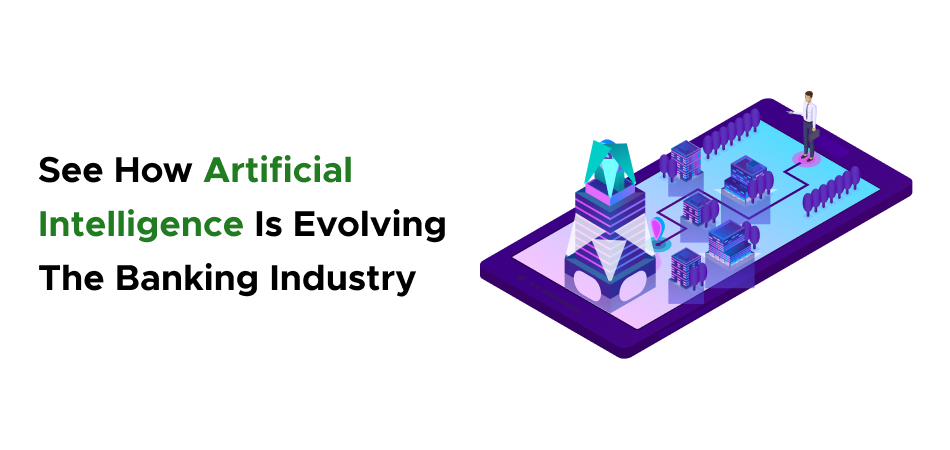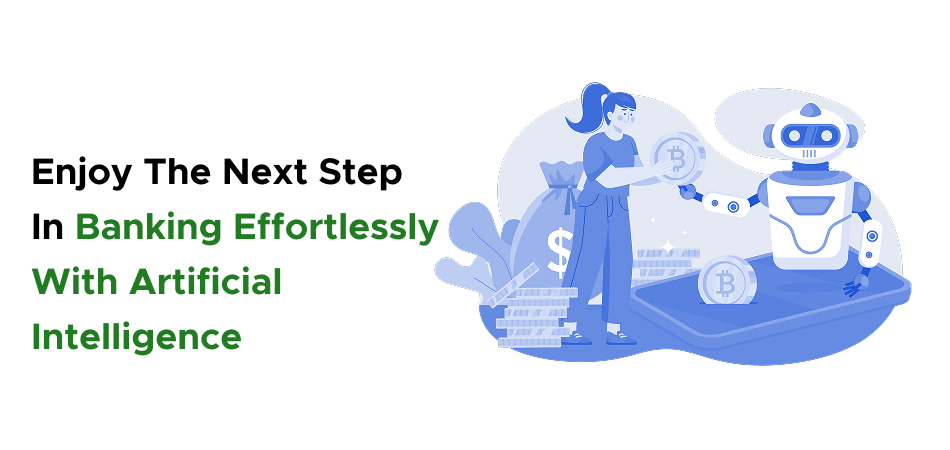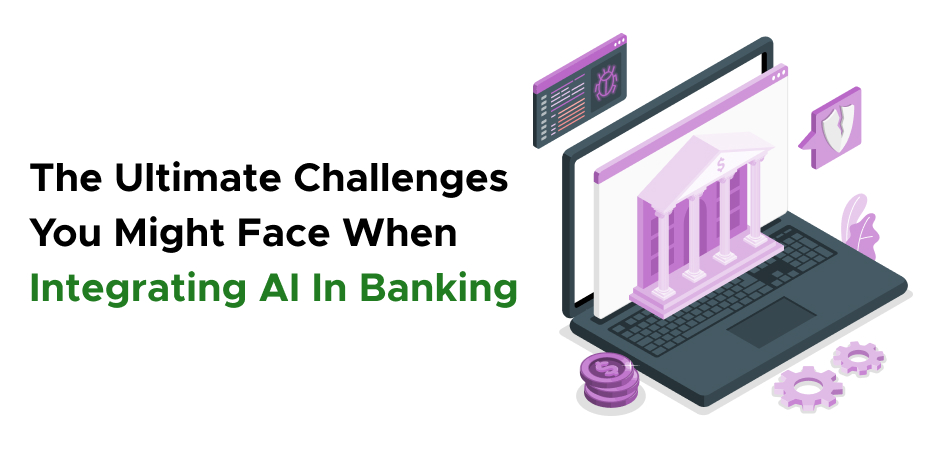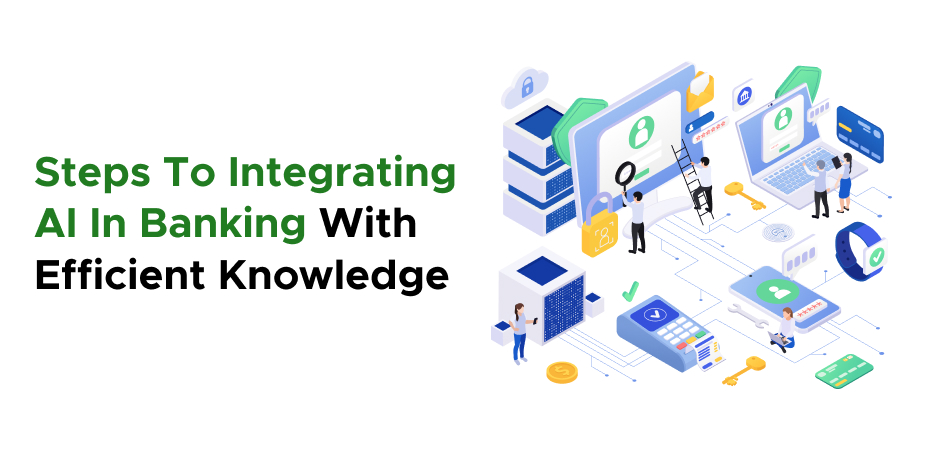Quick Chat
with you!
You have our ear and we can't wait to hear about your idea! Share your details here and we will make sure to schedule a coffee date with you soon.

In a world where your fridge may outsmart your bank app, it’s no longer necessary to embed AI in banking industry– it’s a necessity. But sure, easier said than done, okay? Getting artificial Intelligence into the financial sector is like showing an old ATM new tricks – and the challenges? Oh, they’re not so much technical as they are theatrical. The leading artificial intelligence companies in banking serve as crucial links to transition between established systems and innovative solutions that demonstrate flair.
From wrestling with outdated systems to soothing regulators who treat AI like it’s a rogue stallion, banks have their work cut out. Toss in customer data privacy and the need for hyper-personalized experiences, you’ve got yourself a high-stakes tech conundrum. This is where an astute mobile application development company comes in – to code and decipher anarchy, especially in the realm of artificial intelligence in banking.
Not all heroes wear capes, though – some use APIs. A forward-thinking cross-platform app development company doesn’t merely provide features; they craft intuitive environments where AI can flourish securely and effortlessly. Picture predictive insights, sharper fraud prevention, and 24/7 virtual support – all baked directly into your bank app.
But let’s not beat around the bush. Trust, transparency, and ongoing learning loops are a given. An Android app development firm that knows the banking DNA and AI architecture is your golden ticket to remaining alive – and thriving – in this digital jungle.
So, if your financial app still thinks “machine learning” refers to gym equipment, it’s time to level up.
Through chatbots that answer customer inquiries, banks implement artificial Intelligence to lead banking as a data-oriented, efficient process that substitutes traditional banking approaches. Integrating NLP with RPA and predictive analytics as artificial intelligence components increases operational efficiency for banks.
The banking sector underwent rapid growth because of AI innovations, which led to its industry transformation. Processing delivers vital advantages that let banks offer enhanced client support. Virtual assistants enhanced by AI technology operate continuously to provide customer service, and they decrease customer waiting times and business expenses. The databases use interaction data to increase their intelligence and enhance operational performance.
The detection and prevention of fraudulent activities is a vital functional area, along with others. Artificial intelligence in banking, through AI processing of vast transaction data streams in real-time, enables banks to spot unusual behaviors immediately while preventing threats. The conventional system operating timeline was elongated and subject to human mistakes. A professional mobile app development firm can help you transform your business.
Applying AI systems boosts banks’ evaluation methods to determine credit scores and make loan approval decisions. AI evaluates a bigger range of variables to measure creditworthiness, which enables banks to increase their reach in serving customers of different backgrounds beyond traditional credit profiling.
Operational efficiency receives assistance from AI because the system automates tasks across data entry, compliance checks, and document processing operations. The bank saves costs, and its personnel can redirect their time toward strategic business goals.

Today, a top mobile app development company in Australia plays an important part. It is because today, banks are rushing toward a progressive web app development company to create intelligent mobile applications integrated with AI features that provide personal banking experiences to customers on the go. Such apps vary from voice command banking services to smart financial planning assistants to go beyond the traditional boundaries customers know when interacting with financial institutions.
Besides, it ensures the digital platforms of banks are secure, scalable, and future-ready through a progressive web app development company. By embracing state-of-the-art technologies, these iPhone app development companies would allow seamless integration of AI into mobile platforms, thus providing a strong and high-performing user experience—especially in the context of artificial intelligence in banking.
AI will change the game in banking and will not change with only the passage of time. Quality assurance app development companies that can be trusted to develop mobile applications are likely to help banks along the way to developing, activating, and keeping track of their processes to catch up with the changing times with their customers.
The banking industry is experiencing a revolution through Artificial Intelligence because institutions use it to operate efficiently and deliver better customer interactions. The expanding market need for convenient digital banking requires banks to work with mobile app development companies near me to integrate AI-based solutions into their operational platforms. The following section lists significant advantages resulting from adopting the use of AI in banking sector operations.
Banks use AI technology, including chatbots and virtual assistants, to deliver better customer interactions. Artificial intelligence tools always support customers through bots that respond to queries and solve problems directly without human assistance. Mobile app development companies near me enable banks to place their intelligent assistants directly into mobile banking apps, thus delivering a superior user experience.
Banks need to address the key issue of preventing fraud from occurring. Analyzing extensive real-time transaction data through AI systems helps identify abnormal activities that trigger instant alerts to bank officials and users. The systems use historical data to discover fresh fraud patterns while growing in effectiveness because their learning process remains ongoing. A determined Android mobile app development firm can assist you in integrating AI in banking systems to improve user experience.

Banks gain hyper-personalization abilities through AI systems by studying customer activities, purchase habits, and individual preferences. Organizations in the banking sector present specific financial recommendations and adjusted products through customizable investment alternatives to their customers. A trustworthy mobile app development partner can help organizations integrate such tools within mobile banking applications so customers can improve their financial self-management.
The advancement of artificial Intelligence makes it possible to automate standard work such as document verification, loan processing steps, and new customer setups. Fast operations combined with lower operational costs and reduced human errors become possible through this solution. A proficient metaverse app development company helps build robust systems with AI capabilities to optimize workflow processes efficiently, particularly in the sphere of artificial intelligence in banking.
Banks can predict their capability to lend and market trends through risk management with artificial Intelligence incorporated. It enables an advanced approach to managing risks and applying machine learning models for collecting historical and real-time data to generate insights in a decision-making process at the highest order. These analytics tools can be used as an application within banks for accessing customer and employee-related information.
AI generates nontraditional credit indicators for the significant factors in making reliable decisions on loans and lending. This facilitates the banks lending money to underserved customers or at a lesser risk. AI models will improve counterfeiting in credit scoring and thus have allowed much quicker loan disbursals with lesser default rates.
The banking market is encountering massive transformation through artificial Intelligence, which increases customer satisfaction, fraud prevention ability, and operational worth. Implementing AI within banking systems proves to be a complicated procedure. Implementing AI features with mobile app development companies near me for customer-facing applications presents multiple implementation barriers to banks. A detailed analysis of the six significant challenges exists below.
Integrating AI at banking institutions faces primary challenges because of protecting customer privacy data. The mechanism that AI systems require extensive access to multiple datasets becomes problematic because banks store confidential financial information. This creates potential vulnerabilities. The responsibility for securing data pipelines and AI models primarily lies with banks, even though partnering with a top mobile app development company in Australia helps achieve compliance with GDPR and CCPA.
Traditional banks struggle to integrate contemporary AI solutions because they use old core systems that fail to support modernized AI computing capabilities. Transferring modern AI capabilities into conventional computer systems requires lengthy and expensive implementation work. Implementing middleware or custom APIs by a professional metaverse app development company enables iPhone app development companies to bridge their technological differences, but complete transformation demands paramount financial dedication and deliberate strategy execution.

The development of AI systems depends on rare disciplines like data science, machine learning, and natural language processing, which currently exist at high demand and low supply levels. The lack of internal specialized skills forces banks to depend on business partners to meet their requirements. To access expert talent for AI implementation, banks should work with flutter app development companies specializing in AI but must deal with complex challenges during talent deployment and integration.
The banking market faces strict government regulation through financial standards that maintain unique rules based on different geographical areas. AI algorithm development becomes more complicated due to the need to achieve impartiality during development while avoiding racial and class-based, gender-based, or other unintended bias discrimination. Our trusted mobile application development company specializing in financial compliance can help navigate the regulatory maze while continuing with an innovative application.
AI algorithms come from the data set used to train them. A model trained poorly can learn bias that results in unfair lending decisions or ghost customer profiling. Banks must now be ethical and scramble to assess AI systems regarding ethical risks. Collaborating with top mobile app development companies in Australia that propagate ethical AI development would mitigate these risks and promote transparency in explainability models.
The truth is implementing AI techniques isn’t cheaper. Data acquisition, infrastructure upgrades, training, and system testing costs are heavy. Small to mid-sized banks would have to carry the implementation costs as they are substantial and painful. Nevertheless, collaborative efforts with a buck on the cost of a cross platform app development company would mean fast-tracking the development pace and cutting expenses with agile methodologies and cloud-based solutions.
Current banking sector developments through Artificial Intelligence (AI) lead to improved customer satisfaction, fraud detection technology, and operational efficiency enhancements. Deploying use of AI in banking sector exceeds technology adoption because it needs visionary planning and suitable collaborations, and business needs clarity. These steps will guide successful AI system implementation in banks:
Before implementing AI, banks must select specific issues that AI resolution experiences will address. The four main banking applications using AI technologies are customer support chatbots, fraud prevention tools, customized financial guidance, and automated credit rating systems. A start up app development company that select their most critical business cases achieve optimum ROI with widespread implementation across departments.
AI thrives on data. A bank’s ability to obtain pristine datasets arranged in systematic design and complete information content is essential for their operation. The data consolidation process should merge information collected from many sources, including customer transaction records and CRM system outputs, with collected data from external databases. Before implementing data governance, organizations need to establish practices that will enforce data accuracy and regulatory compliance.

Start-up mobile app development company that operate banks lack native AI development capabilities of their own. Top mobile app development companies in Australia with AI expertise help speed up implementation workflows by providing their services to financial institutions. Businesses specializing in AI integration work with banks to achieve fluid, secure deployment of AI features within mobile banking platforms, supporting the broader adoption of artificial intelligence in banking.
These systems need large quantities of computing capability together with storage capacity. Real-time AI processing requires banks to establish cloud-based or hybrid scalable systems for their infrastructure implementation. Cloud-based systems provide the flexibility needed to maintain continuous model testing and updating because these capabilities are essential for developing correct and compliant AI solutions.
Being a heavily regulated industry, any AI application must comply with financial laws and data protection regulations. The AI models must maintain transparency and explainable mechanisms and undergo frequent inspections. Selecting a top mobile app development company in Australia specializing in financial compliance is essential to dodge legal trouble and damage a company’s reputation. Banks will make sacrifices to protect their reputation, including customer loss.
As a technical revolution, AI is the most powerful force in changing the culture. Special courses would also have to be designed to train them in technological advancements that correlate with their work and how to interpret learning insights from AI-led technologies and AI-based workflow management systems. An app-developing company could offer continuous backup and use of training material to keep bank teams abreast of the new and cutting-edge applications in the market.
Services in banking will become faster and wiser while also delivering personalized solutions due to the rapid development of Artificial Intelligence (AI). The evolving customer expectations and growing competition force banks to adopt artificial intelligence technology to maintain their competitive edge. An evaluation of banking AI developments, along with necessary preparations for forthcoming industrial innovations, forms the focus of this analysis.
Artificial Intelligence will advance customer engagement through offering individualized banking services to customers. Customers can expect AI systems to provide customized financial support through real-time analysis of their behavior to offer appropriate services. Integrating intelligent features through mobile app development by companies in Australia allows banks to boost user engagement and maintain customer loyalty.
AI systems will increase their significance for identifying fraud and evaluating risk because modern cyber threats become complex. New-generation AI systems can rapidly identify irregularities while forecasting forthcoming security risks. Through partnerships with top mobile app development companies in Australia, banks access time-sensitive protective systems that ensure security measures and regulatory compliance in their digital applications.

AI-powered chatbots will progress toward becoming advanced virtual assistant technologies to solve intricate user inquiries. The essential tools will help to improve response times while increasing customer service quality until human agents can focus on more strategic work. Mobile application development company and AI competence enables banks to design conversational bots that provide continuous support by processing natural language interactions.
AI systems in banking are set to generate predictive models that will forecast client requirements through loan timing identifications and investment suggestion functions. Due to their new capabilities, banks will transform from reactive organizations to proactive providers.
The banking industry is experiencing a transformation because AI delivers better operational efficiency, customer-related enhancements, and improved security capabilities. Banks use AI to operate more efficiently by providing customer-specific financial insights while trapping fraud attempts through advanced security measures. To successfully achieve these benefits, banks need superior technological infrastructure and expert partners to lead their implementation.
Banks benefit from using mobile app development partners who integrate AI functionalities into their digital platforms through mobile applications where customers primarily interact. Financial technology and user experience expertise from these quality assurance app development companies guarantee efficient performance and user-friendly operations of AI tools.
A professional app development company assists banks in maintaining industry compliance standards and deploying their AI solutions to other organizational services. Collaborative efforts enable the development of predictive banking tools and safe AI-powered chatbot systems.
Top mobile app development companies in Australia allow banks to maintain market leadership through rapid adjustment to industry changes while delivering better and safer digital services to customers.
Q1. What are the main challenges a top mobile app development company in Australia faces when implementing use of AI in the banking sector?
Ans- Integrating AI into banking apps demands solutions for three main problems: data protection, algorithm system integration, and regulatory compliance. The best mobile app development company in Australia needs to provide effortless user interactions throughout the process as they navigate through artificial intelligence systems and their complex procedures.
Q2. How does the best mobile app development company in Australia ensure the security of AI-powered banking apps?
Ans- Safety stands as the top priority for banking applications. A mobile application development company must utilize strong encryption methods, secure AI training procedures, and persistent data protection protocols to ensure financial data remains protected against operational failures and unauthorized usage.
Q3. What are the primary responsibilities of machine learning during the AI deployment process for top mobile app development companies in Australia working in the banking sector?
Ans- Banks use machine learning to improve their predictive models for fraud and to deliver personalized content to customers through their mobile applications. The best mobile app development company must select proper algorithms and data models to achieve accurate, actionable insights from AI implementations that promote user trust levels.
Q4. Why does a banking institution choose a development company with AI implementation expertise for their partnership?
Ans- When partnered with experienced flutter app development companies near me, such companies can manage the complex process of incorporating AI functionality into bank apps. Their specialist knowledge enables the development of a durable system that lets them analyze real-time data effectively, create better customer interactions combined with industry law fulfillment, and promote AI-based progress.